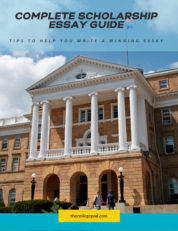Discovering how to find the right college can be a daunting task. With over 4,000 colleges to consider, narrowing down your choices can feel overwhelming. However, asking yourself the following questions will guide you toward finding the college that best suits your needs.
What are your academic or professional goals?
First, you need to think about your academic and your professional goals. While it is not essential to have a major in mind before you apply to college, if you do that’s a great starting point. Look for colleges that offer your major and with a strong record of graduating a high percentage of their students in four years.
If you plan to enter the job market immediately after college, you may want to look for colleges that provide internship opportunities, alumni mentoring, networking opportunities, and relevant career services. For instance, students attending John Hopkins University connect with a "Life Design Educator" (career coach) during their first year of college —a valuable resource in career planning.
If you don’t have a major in mind, don't be disheartened. Many students enter college without a major and then discover interesting career options while taking a class or talking to their advisor. Some colleges even allow students to wait until the beginning of their second or third year to declare a major.
For students pursuing a profession in medicine or law, the college and major you select are very important. You do not need to pursue a “pre-med” major to get into medical school. However, there are certain science courses that will better prepare you for the MCAT (exam required for medical schools). Similarly, you do not have to pursue a "pre-law" major to enter law school; however, some programs might be more advantageous for your future success.
One way to discover a major or profession of interest is to take an Interest Inventory. The Department of Labor offers an Interest Profiler to help you figure out how your interests can be connected to a career. The inventory asks about sixty questions and takes about 20-30 minutes to complete. Another place to research careers is by using the Occupational Outlook Handbook.
After you have gone through this exercise, it will help you list the colleges that are leaders in this particular major.
>>RELATED: College Admissions Guide
What type of school do you prefer?
Second, to find the right college, you have to think about your personal preferences. Do you want to attend a large state university or a small liberal arts college? What about its selectivity? These are only a few of the things you will need to consider when building your college list. You should also take into account how you learn, your preferred geographic location, weather, distance from home, social scene, diversity and living accommodations.
Here are a couple of college search engines that will help you build a college list and research colleges:
In addition to online research, in-person visits were another great way to learn more about a college. However, the pandemic has made that mostly a thing of the past. Most colleges now offer some form of virtual tour and admissions sessions. Attending a virtual admission session will allow you to ask questions and learn more about the school.
Your learning style is often another important element when it comes to selecting a college. To discover your preferred learning style, just reflect on what you prefer in high school. Do you like learning in large groups or prefer those small groups of less than a dozen students? Would you like to have access to your teachers? Ask yourself these questions and you are likely to end up with colleges that are a good academic fit.
Large universities can offer more majors, access to world-class research facilities and professors, and access to a larger alumni network, while smaller colleges will provide more access to professors, more robust advising, and a tight knit community. Small colleges are more likely to offer small classes, although large universities can have smaller programs within them. For example, Texas A&M – one of the largest public universities in Texas, offers smaller honors college and living learning communities.
Can you afford it?
To find the right college, affordability matters. With over 4,000 colleges in the United States, some are more budget-friendly than others. However, just checking the listed prices on college websites isn’t enough. Each student’s actual cost varies based on family circumstances. Start by estimating your net price, which considers scholarships and grants. Use colleges’ net price calculators for this. Additionally, explore the College Scorecard to see average net prices based on income.
Furthermore, many states and cities now offer last-dollar scholarship programs. These programs provide funds to cover the cost of education not covered by federal grants or other scholarships.
To ensure you do not over-borrow, you may want to target best value colleges – colleges that offer the best education for the least amount of money. You do not want to pursue your “dream college” at all costs only to have excessive student debt turn it into a “nightmare college”.
>>RELATED: FINANCIAL AID GUIDE
The idea is not to be “credit averse”, but to borrow responsibly. Using a Net Price Calculator (each college has one on their website) will give you an estimate of grants and scholarships you might receive from a college. Keep in mind, estimates will vary from very reliable to "take it with a grain of salt". There is sadly no consistency with the calculators used by colleges. The more questions included in the calculators, the more accurate they are likely to be.
Can you get in?
The fourth point to consider in selecting the right college for you are your chances of getting in. You should ensure that your college list has a mix of colleges (safety, match and reach) and includes a financial and academic safety college. It is important that you do not shy away from applying to a few colleges where you might fall below the middle 50% of students who are admitted, especially if you think it’s a good fit for you.
Safety colleges are those where you have a high probability of acceptance. A financial safety college is one where you can both get in and afford the tuition. Given the cost challenges faced by many families, a financial safety college is the one that aligns with your family’s financial circumstances while still being likely to admit you.Match colleges are those where you fall within the top or middle 50% of accepted students, making them a good fit. Reach colleges, on the other hand, are either highly selective institutions (such as Ivy League schools) or colleges where your academic profile falls below the middle 50%.
Most colleges will list the middle 50% of students accepted in the previous admissions cycle. This doesn’t mean that you have to fall within that middle 50% group to be admitted. Remember, 25% of students scored higher than the published middle 50%, and 25% of students scored lower.
In addition, many colleges, especially many highly selective colleges, will review your applications holistically. They will look for other attributes aside from your grades. How have you contributed to your community? Do you have a record of leadership? Is there evidence of intellectual curiosity anywhere in your history? Have you done something extraordinary? This is where your resume (or activities sheet) and a well-crafted essay will come in to help tell your story and add another dimension to your application.
Colleges also have their own institutional priorities that often go beyond academics when selecting applicants. Institutional priorities can include plans to become a more inclusive and diverse campus. The diversity a college is seeking to build could include socioeconomic, geographic, race, ethnicity and gender.
Some colleges prioritize recruiting first-generation students. If you identify as one, it might catch the attention of admissions officers. Stay informed by subscribing to news from your top-choice colleges.
Final Thoughts
Discovering the right college is a process that requires time and thoughtful consideration. By seeking out institutions that align with your academic, social, and financial needs, you can significantly impact your college experience and potentially graduate with minimal debt. Remember that finding the right fit isn’t only about what you want—it’s also about understanding what colleges seek in their students.



